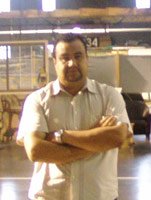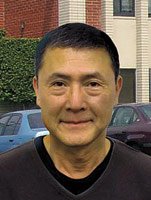Los Angeles Becoming a Mecca for Premium Denim Makers
When Chris Gilbert was casting about for top-notch sewing facilities to shape his high-end blue jeans, the president of Paper Denim & Cloth in New York decided the East Coast would not be where he would do the majority of his production. It would be Los Angeles.
“We chase quality,” said the head of the elite company, which was started in 1999 with a focus on quality and style. “The cut-and-sew factories in Los Angeles have a great needle and are willing to do small runs of units, which is especially important in the beginning.”
Two years ago, Paper Denim & Cloth shifted all its production, which ranges from 500,000 to 700,000 units a year, to Los Angeles. The company’s dyeing is done at laundries in Los Angeles and Kentucky.
“It’s not quite as convenient for us, but we recognize Los Angeles’ apparel industry is very innovative,” Gilbert said. “There’s more competition than there has ever been before in premium denim. It’s more important to push the envelope every season and be as innovative as possible.”
The Los Angeles apparel industry’s ability to hold on to a handful of good local sewing contractors, which have faced a mountain of competition from offshore facilities catering to mass denim makers, is paying off. Consumers’ demand for wellmade premium denim jeans selling for more than $100 a pair is helping to resuscitate a dying profession.
Los Angeles was the lure for the designers of James. Frustrated from a lack of resources, designers James Chung and Seun Lim packed their bags and moved from New York to Los Angeles nearly a year ago. Being local has helped the designers keep a close eye on operations.
“Because the novelty wash is an important element of the premium denim look, the consistency in quality is important,” Chung said. “If the level of wash treatment is off just a little bit, it can be very costly for the laundry house and the manufacturer. It can ruin your season.”
Chung and his partner join other out-ofstate manufacturers, including Ernest Sewn and Ijean—as well as Los Angeles denim makers True Religion, Serfontaine, Joie, Citizens of Humanity, Blue Cult and Seven for All Mankind—in making Los Angeles the preferred destination for producing a well-formed pair of jeans.
For many of these players, the ability to test new trends with quick-turn production is a huge advantage.
“The size and diversity of the L.A. regional apparel market is so vast and fast-moving that companies want to be closer to the market,” said Dwayne A. Gathers, regional manager at the Los Angeles County Economic Development Corp. “In this case, apparel makers coming to set up shop in L.A. are just trying to be more responsive to their customers by being closer to them.”
Everyone has their own reasons for choosing Los Angeles as their creative home base. “It’s the city’s long history as an apparel center, celebrity factor and great specialty retail business that is making the high-end jean business boom right now,” said veteran denim designer Adriano Goldschmied, who has made Los Angeles his home base.
The denim market represents $11 billion in annual U.S. retail sales. Higher-end jeans, which retail for $75 and up, represent 3.5 percent of that, or $385 million, said Marshal Cohen, chief apparel analyst at The NPD Group Inc., a market research firm in Port Washington, N.Y.
Perfect formula
Most high-end denim designers said their focus is in three areas: fabric, fit and wash, with a big emphasis on fit and wash.
That is why Los Angeles is so popular. Local cut-and-sew contractors that specialize in premium denim have the production capabilities to offer a wide variety of contemporary construction details and innovative stitch designs. Those contractors include My Shin Fashions Inc. in Los Angeles and Classic Vogue and Young Bae Fashions in Vernon, Calif.
There are also about a dozen laundry houses scattered throughout Los Angeles that are fine-tuning their expertise in specialty washes and novelty treatments. Wash houses that have found a niche in the growing denim market include Caitac Garment Processing Inc. in Gardena, Calif.; Fresh- Tex International Textile Service, a division of Germany-based Alt Group, in South Gate, Calif.; Artist Dye in El Monte, Calif.; and Final Finish and Quick Wash Laundry, both in Los Angeles. Most offer two types of processes: a dry process (hand abrasion and hand sanding) and a wet process (dyeing and bleaching).
Investing in the future
With the popularity of high-end denim on the rise, laundry houses are beginning to invest in the machinery necessary to produce high-quality products.
Caitac plans to invest somewhere between $350,000 and $500,000 in new processing equipment by 2005, according to Brian Mc- Mullin, chief financial officer. With prices ranging from $8 to $16 per treatment, the wash house processes approximately 70,000 pieces of denim each week for such high-end denim clients as Seven for All Mankind, Citizens of Humanity, Paper Denim & Cloth and Earl Jean.
FreshTex opened a facility in Los Angeles last year to cater to the denim world. The apparel textile conglomerate operates 29 laundry facilities in 17 countries—including Turkey, Italy, the Dominican Republic, Honduras, Guatemala, India and China—but was not operating in the United States.
FreshTex West Coast Manager Tony Rodriguez said it took some convincing to get the parent company to make the move to the West Coast.
“A lot of industry people thought it was a crazy idea to open a laundry business in Los Angeles because most of the city’s production is shifting offshore,” Rodriguez said. “But I know it’s a good place to start a business because all of the denim brands are born here.”
With roughly 400 employees at its 72,000- square-foot facility, FreshTex offers full-service apparel manufacturing, dyeing, washing, specialty treatments and finishing. About 10,000 pieces of denim each day are given treatments such as hard-core vintage washing with resin, whiskering, grinding, hand sanding, and age enhancing with spray potassium and other chemicals. It is labor-intensive. “We don’t use machines because we don’t want it to look fake or mechanical, so we do all of our processing by hand,” Rodriguez said.
After a year in business, FreshTex’s customer base has grown to 10 clients. Rodriguez said some of his clients are small, independent denim makers that “are trying to reach the next level.”
With some help from the big and little apparel guys, Rodriguez estimates his monthly volume of $1.5 million will double next year.
Follow the money
The biggest difference between producing locally and producing offshore boils down to price. It costs anywhere from $9 to $20 to produce a pair of jeans in Los Angeles, and some offshore producers can make a pair of blue jeans for as little as $5 a pair.
But premium denim manufacturers, which produce blue jeans commanding as much as $395 a pair, can pay more and still make a handsome profit because gross profit margins are as high as 40 percent.
With all this new business, local contractors are very competitive with each other, developing specialties to garner customers. Classic Vogue, a 20-year-year-old sewing plant, applies its contemporary design expertise to apparel clients such as Juicy Couture and Hudson Jeans. The company’s 60 employees produce roughly 25,000 pairs of denim each month. The company charges anywhere from $6 for a pair of basic denim to $10 for detailed denim styles, owner Tony Hongkham said.
Distinct ingredients
For some, margins and profitability are key factors in deciding where a denim line will be produced. For others, innovative designs and washes dictate where a denim line will be made.
As premium denim’s popularity increases, it becomes very important to create a distinction between premium denim production and mass-market production, said Cohen of The NPD Group.
“Quality, brand image, continual innovation and novelty is what distinguishes each label,” Cohen said. “Part of their evolution involves speed to market and working closely with the facilities that do that. Premium denim makers live and breathe thinking how to make their denim new, novel and expensive. It’s a unique niche market that doesn’t lend itself to the Asian or Third World market.”
Many high-end denim makers import their fabrics from Italy and Japan, while others prefer to source from domestic fabric makers.
Greensboro, N.C.–based textile maker Cone Mills LLC has shifted its focus to the premium denim market. Marie Edwards, account executive at Philip E. Goetz Co. in Los Angeles, an independent sales rep for Cone Mills, said her office has between 30 to 40 high-end denim customers at any given time. Most are interested in purchasing domesticmade ring-spun, cross-hatch and slub denim fabrics that range from $3.25 to $4.95 per yard, she said. Cone Mills produces its premium denim fabrics at its Greensboro facilities.
Fine fabrics are what denim designers are counting on to differentiate their jeans from competitors and boost profits. That is true for Jeff Lubell, president of True Religion, a Los Angeles premium denim company that saw its profits grow to $4.1 million in the second quarter of this year. “We put a lot of energy into picking the right fabrics, threads, tack buttons, labeling and fit,” he said.
























